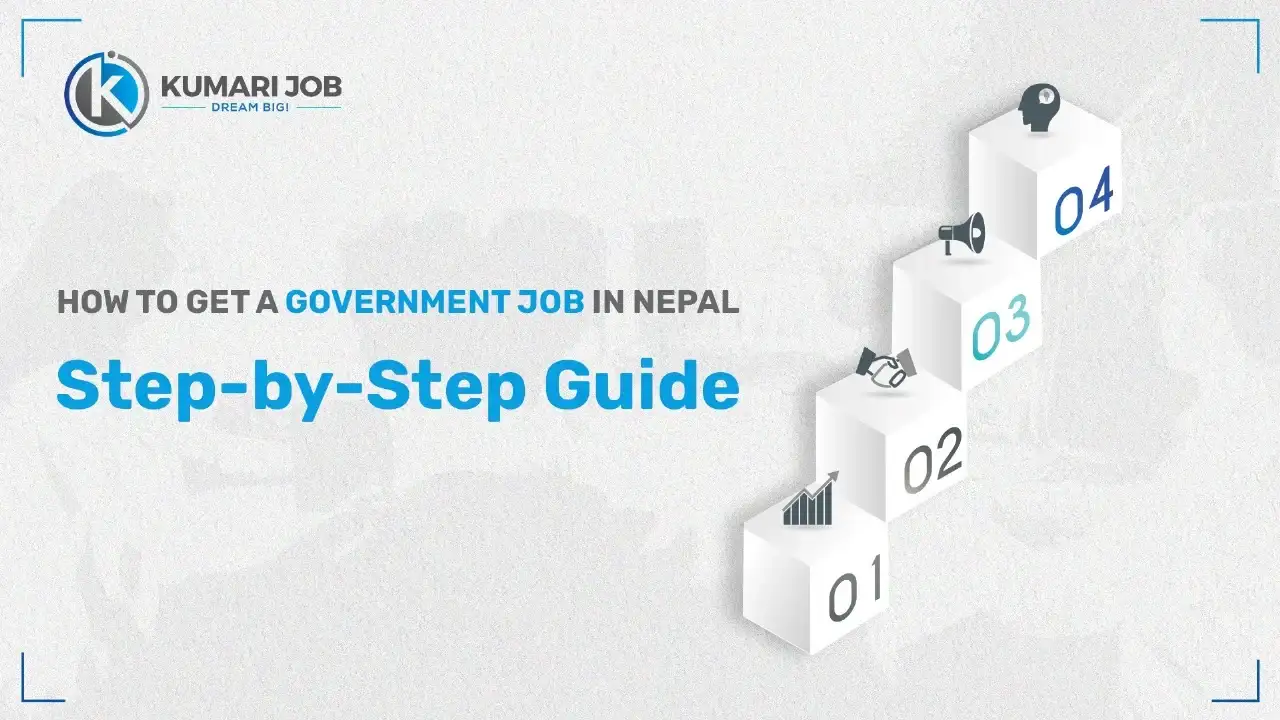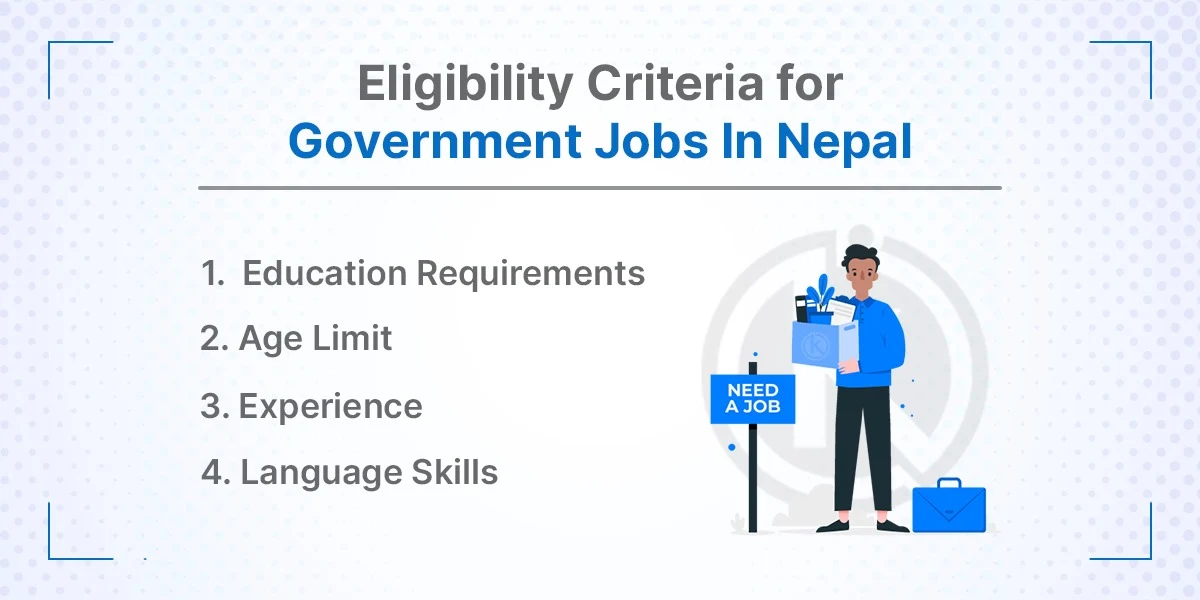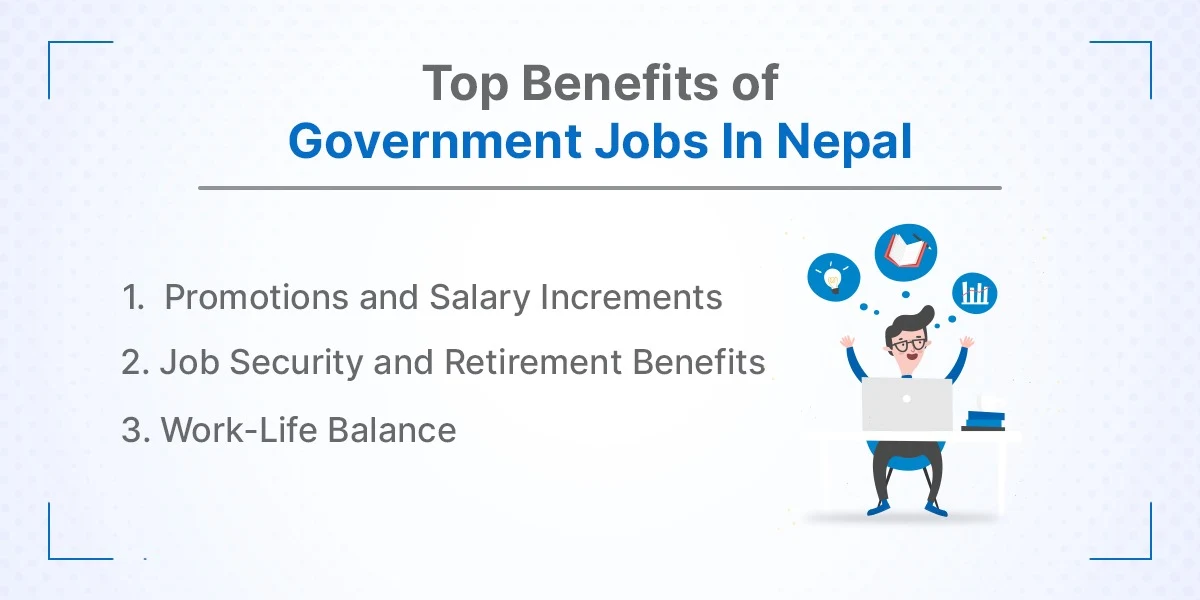
Many students and job seekers in Nepal aim for government jobs because of their stability, respect, and long-term benefits. Whether it's in administration, healthcare, education, or technical fields, government jobs are known for providing security, good facilities, and a clear path for career growth.
Compared to private jobs, government jobs in Nepal offer lower stress, better work-life balance, and benefits like pensions, allowances, and job security. While private jobs may offer higher salaries, they often come with more pressure and fewer long-term benefits. In this guide, you'll learn about the types of government jobs in Nepal, eligibility requirements, the application process, exam preparation tips, interview guidance, and the benefits of working in the government sector.
In this blog
Types of Government Jobs in Nepal
Government jobs in Nepal come in various types, making them accessible to individuals of all education levels, from SLC/SEE to postgraduate across fields from technical to medical, and for roles from clerical to managerial levels, regardless of caste or religion. The main types of government jobs in Nepal are listed below:
1. Administrative Jobs
Civil services (Nijamati Sewa) are basically office jobs in different ministries and departments of the central government. These job roles can be for helpers like janitors and office assistants, or higher-level posts like section officers and undersecretaries. This type of government job includes work areas like management, accounting, foreign service, engineering, teaching, and health. People are selected through the Lok Sewa Aayog (Public Service Commission). These jobs are permanent and have good chances to grow in the future.
2. Technical and Health Services
This group includes doctors, nurses, engineers, and other skilled workers like lab technicians who work in government hospitals, health posts, and development projects. Based on where the job is located, people are hired by either the central or the provincial government.
3. Education and Teaching Jobs
This group includes teachers for primary and secondary schools who are selected by the Teachers Service Commission (TSC), as well as university teachers like lecturers and professors who university service commissions choose. The levels of jobs range from school teachers to university professors. To apply, people must have the needed education and teaching license.
4. Police and Security Jobs
This group includes the Nepal Army, Nepal Police, Armed Police Force (APF), and National Investigation Department (NID). These jobs are related to protecting the country, keeping peace and safety inside the country, helping during disasters, and collecting important information. These security offices hire people through their own process, which usually includes physical tests, written exams, and health checkups.
5. Other Government Agencies
Jobs in government offices like Nepal Electricity Authority, Nepal Telecom, and Rastriya Banijya Bank include many types of work, such as technical, management, and support. People can work as engineers, accountants, customer service staff, or IT helpers. These jobs come under state-owned enterprises.
Also, under local government jobs, there are many jobs in city and village offices. These include office staff, technicians, health workers, and farming officers. These jobs are given through exams by the Local Public Service Commission or by the local offices themselves. These jobs are important to provide better services and help develop local areas, especially after Nepal became a federal country.
Eligibility Criteria for Government Jobs in Nepal
To apply for the available jobs in the Nepali job market, the participants must qualify according to government standards as follows:

1. Education Requirements
An SLC/SEE qualification is required for junior positions like clerk and office assistant. But if you hold a bachelor's degree, you are free to apply for officer-level jobs. Similarly, skill degrees are required in some job applications, such as engineering, medical, or law.
2. Age Limit
Generally, individuals aged 18 to 35 years are suitable to be considered for government job positions. However, the age limit is waived to 40 for females and members of reserved classes.
3. Experience
Freshers can apply for junior-level positions, but senior-level or technical positions require experience.
4. Language Skills
Nepali and English are the preferred languages for every job position. English language proficiency can be required as a minimum for certain jobs, such as foreign affairs and education.
How to Apply for Government Jobs in Nepal?
To apply for a government job in Nepal, visit job portals like Kumarijob and Loksewa, check newspapers, or apply directly through the government website.
1. Job Portals and Websites
You can find government job vacancies on trusted job portals like Kumari Job and Loksewa Aayog (PSC). These platforms provide detailed information about available positions, eligibility, deadlines, and how to apply. You can filter jobs based on your qualifications and apply directly through the portal.
2. Government Websites
Many government departments and public institutions publish job vacancies on their official websites. Always check the official site of the concerned ministry or department for authentic job notices and application forms.
3. Newspaper and Official Notice
Government vacancies are published in newspapers like Gorkhapatra, Kantipur, and The Rising Nepal.
4. Direct Recruitment by Government Departments
Direct vacancies are also advertised, and job vacancy applications are accepted directly from government offices by way of the official company website as well.
Steps to Prepare for Government Job Exams
To prepare for Government Job Exams in Nepal, follow the steps below:
1. Understanding the Exam Format:
The most commonly practiced exam format starts with written tests, followed by interviews, and practical testing is done occasionally for some types of enrollments.
2. Subjects and Syllabus
For subject-related syllabus, they post the official syllabus for each vacancy on the Loksewa website and other official pages. Commonly, a syllabus contains general knowledge, mathematics and subject-related topics.
3. Study Materials and Resources
Books and references are usually suggested by official pages for Loksewa exams, but you can also refer to coaching centers, YouTube lessons, and internet resources for better clarity.
4. Creating a Study Plan
Create a daily or weekly schedule for study with sufficient time for revision and focus on national and international news and current affairs. Take practice exams regularly and concentrate on challenging subjects to gain confidence.
Tips for Passing Government Job Exams
Government job examinations in Nepal are highly competitive and require dedicated preparation, strategic planning, and regular practice. Below are essential recommendations to assist candidates in their preparation to successfully pass the exams:
1. Effective time management
Time management is very important for passing government job exams. So start by dividing your day into some timetables and assigning subjects or topics according to your strengths and weaknesses. Study hard for 45 to 60 minutes, having frequent breaks to keep your mind sharp. Decide on your most suitable working time, such as early morning or late night, and spend these hours studying. Make use of the weekends to practise and revise nicely.
2. Practice previous years' papers.
Last year's papers helped you get used to the exam pattern, common question types, and time element. This exercise helps you identify repeated questions and estimate the level of difficulty in the exam. This helps to improve your speed and accuracy, both of which are crucial on exam day.
3. Stay Updated on Current Affairs
All government exams have a current affairs section with questions on recent happenings, policies, and schemes. Familiarity with government proposals, budgets, national and international affairs, and the economy will be helpful in interviews and group discussions. So, read newspapers daily to know what's happening, particularly in the country and the economy. Collect important news, dates, and facts from monthly magazines and write them down in a notebook or on your mobile phone to make it easier for you to revise.
4. Focus on Nepal-specific Topics
Always read Nepal's history, geography, and culture in depth. Questions on politics, federation, and great historical events are regularly put in exams. The geography part can have questions about rivers, mountains, climate zones, and provinces. Cultural topics like languages, festivals, and ethnic groups are also included. Knowledge of the constitution, government system, and basic rights is also very important to prepare overall.
Interview Preparation for Government Jobs
An interview session is as important as passing the written tests for the selection of a government job. In an interview, a candidate is evaluated not only for his/her knowledge but also for their communication skills, personality, and fitness for the job.
1. Common Interview Questions
Government job interviews usually start with simple questions like “Tell us about yourself,” “Why do you want this job?” or “What do you know about this department?” They may also ask about your education, past experience, and weaknesses. Be honest and show how your goals are compatible with the job and how you will work in the public interest. The interview is formal and most often carried out by a panel of two or more people. You can expect questions on current events, national issues, and the department's role. They may also give you situations to test your thinking and knowledge of government policies.
2. How do you present yourself professionally?
To present yourself professionally, wear formal or semi-formal clothes in pale and pastel shades, sit up straight, maintain direct eye contact, and keep unnecessary movement to a minimum. Greet the panel with "Good Morning" or "Namaste" and remain respectful in tone. State confidently but avoid overstatement to develop a positive vibe in the room.
3. Preparing for Behavioral Interviews
Interviewers use behavioural questions to understand how you behave in different situations. For example, they might ask, "Give an example where you overcame a challenge," or "Narrate an occasion when you collaborated with a group." To answer, use the STAR method: explain the Situation, your Task, the Action you undertook, and the Result. Use specific instances from your past experience at work, school days, or college days so that you can give understandable and real responses.
Common Challenges and How to Overcome Them
It is not an easy task to prepare for government job exams, and every candidate goes through similar problems. It will make you focused and help you stay motivated if you learn how to solve these problems.
1. Long Gap Between Exam and Result
Government exams have a big gap between conducting the exam and announcing the results, which can make you doubtful or tense. To overcome this, do not lose hope. Continue preparing for the subsequent exam or stage. Use this period to expand your overall knowledge, practice even more, or learn new things. Have patience and faith in your hard work.
2. Limited Seats and High Competition
As there are numerous applicants but few seats available, the competition is extremely intense. It is normal to get depressed, but rather than compare yourself with other people, concentrate on your progress. Get some small, measurable achievements and enjoy your development. Keep on working normally, and continuous work increases your chances of success.
3. Overcoming Failures and Reapplying
Failing an exam can feel upsetting, but it’s not the end. Many successful people failed before they succeeded. Learn from your results by finding your weak areas and working to improve them. Stay positive and make a new study plan with better methods. Keep trying because every attempt brings you closer to success.
Top Benefits of Government Jobs in Nepal
Government jobs offer a balanced lifestyle, regular promotions, and long-term secure employment. Being aware of these benefits can encourage you to remain focused on your preparation.

1. Promotions and Salary Increments
For government Jobs, promotions solely rely on the number of years you have put in, the performance you showed, and as per department policy. With the passage of time, you get to move into senior-level posts with more responsibilities and higher salaries. Periodically, you are also promoted in pay scales as per the given pay band. You even receive bonuses or grade increments depending on your post and performance.
2. Job Security and Retirement Benefits
Government employees have very good job security, so employees are not terminated even in the most difficult times of the economy. After working for a few years, they have retirement benefits like pension, gratuity, and provident fund. All of these benefits allow them to provide financial support even after retirement.
3. Work-Life Balance
Government jobs have normal office hours, with weekends and public holidays being off days. This facilitates employees' having a proper work-life balance. The majority of the jobs also include benefits such as maternity leave or paternity leave, casual leave, and earned leave that promote overall welfare.
Conclusion
Getting a government job in Nepal takes time, patience, and good preparation. There are many people trying to find a seat, so it is important to stay focused. Make a clear study plan, follow the news, practice old questions, and get better at interviews. Every hour you study brings you closer to your goal.
If you don't succeed at first, don't lose hope. Other people fail twice or once before they can succeed. What matters is that you keep on trying. Let your failure make you wise, a better person, and believe in yourself. Working for the government is not just about job security. It also gives you a chance to serve the country with pride. Let your hard work pave the way. Hold tight, and before you know it, your time will come.
Determined to secure a government job? Explore the latest government job vacancies in Kathmandu and prepare yourself for the opportunity to serve with pride.











Loading Comments...